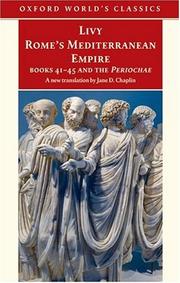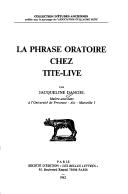| Listing 1 - 10 of 42 | << page >> |
Sort by
|
Book
ISBN: 9011862058 9789011862050 Year: 1971 Publisher: Culemborg : Tjeenk Willink/Noorduijn,
Abstract | Keywords | Export | Availability | Bookmark
 Loading...
Loading...Choose an application
- Reference Manager
- EndNote
- RefWorks (Direct export to RefWorks)
Book
Year: 1872 Publisher: Berlin : Weber,
Abstract | Keywords | Export | Availability | Bookmark
 Loading...
Loading...Choose an application
- Reference Manager
- EndNote
- RefWorks (Direct export to RefWorks)
Language and languages. --- Syntax. --- Livy --- Livy. --- Livius, T. --- Livius, Titus. --- Language.
Book
ISBN: 9050271111 9050271103 9789050271110 Year: 2002 Publisher: Lunteren Hermaion
Abstract | Keywords | Export | Availability | Bookmark
 Loading...
Loading...Choose an application
- Reference Manager
- EndNote
- RefWorks (Direct export to RefWorks)
Schoolbooks - Didactic material --- Livius, Titus --- Livy --- Livius Patavinus, Titus --- Titus Livius --- Tite-Live --- Livyus, Titus --- Liviĭ, Tit --- Liwiusz, Tytus --- Livio, Tito --- Livius, T. --- Livio --- ליוויוס, טיטוס

ISBN: 0191828505 1281147001 9786611147006 1435699025 0191517844 9780191517846 9781435699021 9780191828508 6611147004 0192833405 9780192833402 9781281147004 0199556024 Year: 2007 Publisher: Oxford New York Oxford University Press
Abstract | Keywords | Export | Availability | Bookmark
 Loading...
Loading...Choose an application
- Reference Manager
- EndNote
- RefWorks (Direct export to RefWorks)
The Third Macedonian War ended the kingdom created by Philip II and Alexander the Great and was a crucial step in Rome's dominance of the Mediterranean. Livy's narrative is also a moral study of the individuals involved. This edition includes the Periochae, later summaries of Livy's original 142-book history.
Livy --- Livius, Titus --- Livius Patavinus, Titus --- Tite-Live --- Livyus, Titus --- Liviĭ, Tit --- Liwiusz, Tytus --- Livio, Tito --- Livius, T. --- Livio --- ליוויוס, טיטוס --- Rome --- History. --- Titus Livius
Book
ISBN: 9782503592985 9782503593012 2503593011 2503592988 Year: 2021 Publisher: Turnhout : Brepols,
Abstract | Keywords | Export | Availability | Bookmark
 Loading...
Loading...Choose an application
- Reference Manager
- EndNote
- RefWorks (Direct export to RefWorks)
This volume gathers the papers of a conference on Livy held at the University of Padua, on the occasion of the bimillenary of the historian's death (6-10 November 2017). The aim of the volume is to shed new light on lesser-known aspects of Livy's historiography, by approaching his work from a broad and interdisciplinary perspective. The papers, written by established scholars as well as by younger researchers, span from classical philology to ancient history and archaeology, also incorporating an in-depth investigation of Livy?s reception through the centuries (from the Middle Ages to the Modern Era) and different fields of the humanities (philosophy, political thought, figurative arts)
Livius, Titus --- Livy --- Livius Patavinus, Titus --- Titus Livius --- Tite-Live --- Livyus, Titus --- Liviĭ, Tit --- Liwiusz, Tytus --- Livio, Tito --- Livius, T. --- Livio --- ליוויוס, טיטוס --- Esthétique de la réception
Book
ISBN: 0691035520 9780691035529 0691198896 0691610479 0691656266 Year: 1977 Publisher: Princeton, N.J. Princeton University Press
Abstract | Keywords | Export | Availability | Bookmark
 Loading...
Loading...Choose an application
- Reference Manager
- EndNote
- RefWorks (Direct export to RefWorks)
Professor Luce considers to what extent Livy may be said to have been in control of his historical material. What is the significance, the author asks, of the units by which Livy structured his history? How did he go about preparing himself to write, and what methods did he use in the course of actual composition? Did he have an interpretation of his own concerning the overall course of Roman history, and, if so, how did it affect his selection and arrangement of material?The author examines these questions largely by the means of an analysis of Books 31-45, which he compares with the work of Polybius. He then scrutinizes the design of the history as a whole, its author's attitude toward his srouces generally, and his method of composition. A final chapter considers how Livy's use of material may have been influenced by his view of change and development in Roman history, particularly with regard to the genesis and declince of the Roman national character. By examining LIvy's method of creation, Professor Luce extends our understanding of his achievement.T.J. Luce is Professor and Chairman of the Classics Department at Princeton University.Originally published in 1978.The Princeton Legacy Library uses the latest print-on-demand technology to again make available previously out-of-print books from the distinguished backlist of Princeton University Press. These editions preserve the original texts of these important books while presenting them in durable paperback and hardcover editions. The goal of the Princeton Legacy Library is to vastly increase access to the rich scholarly heritage found in the thousands of books published by Princeton University Press since its founding in 1905.
Livy --- Livy. --- Rome --- History --- Histoire --- Historiography --- Tite-Live --- Livius, Titus --- Livyus, Titus --- Liviĭ, Tit --- Liwiusz, Tytus --- Livio, Tito --- Livius, T. --- Livio --- ליוויוס, טיטוס --- Historiography. --- Livius Patavinus, Titus --- Livius --- Titus Livius --- Livy - Ab urbe condita --- Rome - Historiography

ISBN: 3598777191 3111885534 3110964937 Year: 2002 Volume: 170 Publisher: München Saur
Abstract | Keywords | Export | Availability | Bookmark
 Loading...
Loading...Choose an application
- Reference Manager
- EndNote
- RefWorks (Direct export to RefWorks)
Die Frauen spielen im Geschichtswerk des Titus Livius (ca. 59 v. Chr. - 17 n. Chr.) eine erstaunlich große Rolle. Gefehlt hat aber bisher eine umfassende Arbeit, die die Frauengestalten aus der Sichtweise des römischen Historikers deutete. Konkret geht es um das Problem: Welche positive oder negative Lehre kann und soll der zeitgenössische Leser aus dem Schicksal der dargestellten Frauengestalten ziehen? Dieser und ähnlichen Fragen geht die vorliegende Monographie nach und fächert dabei das breite Spektrum der Frauengestalten auf, das Musterbilder der Keuschheit ebenso wie skrupellose Mörderinnen umfasst, Heldinnen ebenso wie Verräterinnen oder auch Königsmacherinnen.
Women --- Historiography --- History. --- Livy --- Criticism and interpretation. --- Livius, Titus --- Livius Patavinus, Titus --- Tite-Live --- Livyus, Titus --- Liviĭ, Tit --- Liwiusz, Tytus --- Livio, Tito --- Livius, T. --- Livio --- ליוויוס, טיטוס --- Titus Livius
Book
ISBN: 2356134735 9782356134738 Year: 2022 Publisher: Pessac Ausonius éditions
Abstract | Keywords | Export | Availability | Bookmark
 Loading...
Loading...Choose an application
- Reference Manager
- EndNote
- RefWorks (Direct export to RefWorks)
"Plus de 2000 ans après sa mort en 17 de notre ère, les découvertes archéologiques, à Rome et dans le Latium, voire en Étrurie, ont amené à réévaluer l'oeuvre de Tite-Live, longtemps considérée comme une source moins fiable que Polybe ou Plutarque pour l'histoire romaine. Dès lors, de nouvelles lectures ont été proposées selon des approches historiographiques récentes, ainsi que de multiples études stylistiques, narratologiques, philologiques. Néanmoins, sa méthode historique, son attitude religieuse, ses relations avec le nouveau pouvoir augustéen et son regard sur la vie politique romaine, ses choix de composition et de publication ou encore les conditions de sa réception sont toujours l'objet de controverses et, si la première décade a été et reste très étudiée, la troisième et la quatrième sont encore peu explorées, tout comme les Periochae. En outre, les (re)lectures successives de l'Ab Vrbe condita au fil des siècles continuent encore à façonner en partie nos représentations de l'histoire et de la société romaines. Voilà les questions que ces actes du colloque organisé les 19 et 20 septembre 2017, à l'Université Paris Nanterre et à l'École normale supérieure de Paris, ont cherché à approfondir, suivant quatre axes : la réécriture livienne de l'histoire romaine ; la philosophie livienne du pouvoir ; son écriture de l'histoire au carrefour entre choix littéraires et idéologiques ; les postérités de cette oeuvre."
Livius, Titus --- Livy --- Livius Patavinus, Titus --- Titus Livius --- Tite-Live --- Livyus, Titus --- Liviĭ, Tit --- Liwiusz, Tytus --- Livio, Tito --- Livius, T. --- Livio --- ליוויוס, טיטוס --- Influence littéraire, artistique, etc. --- Historiographie
Book
ISBN: 8806056085 Year: 1983 Volume: 185 Publisher: Torino
Abstract | Keywords | Export | Availability | Bookmark
 Loading...
Loading...Choose an application
- Reference Manager
- EndNote
- RefWorks (Direct export to RefWorks)
Classical Latin literature --- Italian literature --- Machiavelli, Niccolò --- Livy --- Political science --- Science politique --- Early works to 1800 --- Ouvrages avant 1800 --- -Administration --- Civil government --- Commonwealth, The --- Government --- Political theory --- Political thought --- Politics --- Science, Political --- Social sciences --- State, The --- Tite-Live --- Livius, Titus --- Livyus, Titus --- Liviĭ, Tit --- Liwiusz, Tytus --- Livio, Tito --- Livius, T. --- Livio --- ליוויוס, טיטוס --- -Early works to 1800 --- Livius Patavinus, Titus --- Livius --- Titus Livius --- Livy.

ISBN: 2251328505 9782251328508 Year: 1982 Publisher: Paris
Abstract | Keywords | Export | Availability | Bookmark
 Loading...
Loading...Choose an application
- Reference Manager
- EndNote
- RefWorks (Direct export to RefWorks)
Livy --- Language --- Technique --- Rhetoric, Ancient --- Classical languages --- Greek language --- Greek rhetoric --- Latin language --- Latin rhetoric --- Rhetoric --- -Tite-Live --- Livius, Titus --- Livyus, Titus --- Liviĭ, Tit --- Liwiusz, Tytus --- Livio, Tito --- Livius, T. --- Livio --- ליוויוס, טיטוס --- Rhetoric, Ancient. --- -Technique --- -Livy --- Tite-Live --- Ancient rhetoric --- -Livius Patavinus, Titus --- Livius --- Titus Livius --- Livius Patavinus, Titus --- Technique. --- Language. --- Livy - Technique
| Listing 1 - 10 of 42 | << page >> |
Sort by
|

 Search
Search Feedback
Feedback About UniCat
About UniCat  Help
Help News
News